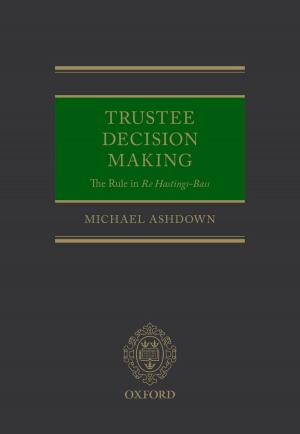The Oxford Handbook of Management Theorists
Business & Finance, Human Resources & Personnel Management, Organizational Behavior, Management & Leadership, Management| Author: | ISBN: | 9780191645372 | |
| Publisher: | OUP Oxford | Publication: | February 28, 2013 |
| Imprint: | OUP Oxford | Language: | English |
| Author: | |
| ISBN: | 9780191645372 |
| Publisher: | OUP Oxford |
| Publication: | February 28, 2013 |
| Imprint: | OUP Oxford |
| Language: | English |
Concurrent with the increasing complexity of the field of management, the need to re-examine the foundations from which its theories have advanced has become ever more important and useful. The Oxford Handbook of Management Theorists examines and evaluates the contributions that seminal figures, past and present, have made to the theory of management by providing in-depth, up-to-date, and detailed scholarly analysis of their ideas and influence. Chapters by leading management and management history scholars explore the origins of each thinker or school of thought and their ideas, and discuss the significance and influence in a broader framework. The Handbook contextualises each theorist and their theories, analysing their actions, interactions, and re-actions to contemporary events and to each other. It is arranged in three parts: pioneers of management thinking from Frederick Taylor to Chester Barnard; post-war theorists, such as the Tavistock Institute and Edith Penrose; and the later phase of Business School theorists, including Alfred Chandler, Michael Porter, and Ikujiro Nonaka. This book will be essential reading for anyone interested in how and why management ideas have emerged, and the ways in which they are currently developing and will evolve in the future.
Concurrent with the increasing complexity of the field of management, the need to re-examine the foundations from which its theories have advanced has become ever more important and useful. The Oxford Handbook of Management Theorists examines and evaluates the contributions that seminal figures, past and present, have made to the theory of management by providing in-depth, up-to-date, and detailed scholarly analysis of their ideas and influence. Chapters by leading management and management history scholars explore the origins of each thinker or school of thought and their ideas, and discuss the significance and influence in a broader framework. The Handbook contextualises each theorist and their theories, analysing their actions, interactions, and re-actions to contemporary events and to each other. It is arranged in three parts: pioneers of management thinking from Frederick Taylor to Chester Barnard; post-war theorists, such as the Tavistock Institute and Edith Penrose; and the later phase of Business School theorists, including Alfred Chandler, Michael Porter, and Ikujiro Nonaka. This book will be essential reading for anyone interested in how and why management ideas have emerged, and the ways in which they are currently developing and will evolve in the future.















